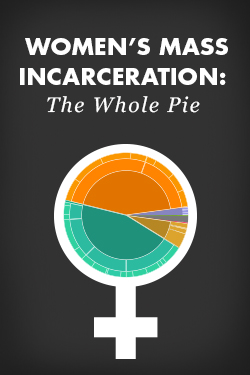Please welcome our new Communications Strategist, Wanda Bertram!
by Wendy Sawyer,
October 25, 2017
 Please welcome our new Communications Strategist, Wanda Bertram.
Please welcome our new Communications Strategist, Wanda Bertram.
Wanda is a graduate of the University of Washington, where her focus on national security sparked her interest in prison policy and immigrant detention. She has reported on local criminal justice reform as a Seattle-based freelance writer while producing, managing, and strengthening the communications of area nonprofit organizations.
Welcome, Wanda!
New report details the number of women who are locked up by various correctional systems and why.
October 19, 2017
 With 219,000 women locked up in facilities operated by thousands of agencies, getting the big picture is anything but easy. In our new report, Women’s Mass Incarceration: The Whole Pie 2017, we use our “whole pie” approach to give the public and policymakers the foundation to end mass incarceration without leaving women behind.
With 219,000 women locked up in facilities operated by thousands of agencies, getting the big picture is anything but easy. In our new report, Women’s Mass Incarceration: The Whole Pie 2017, we use our “whole pie” approach to give the public and policymakers the foundation to end mass incarceration without leaving women behind.
Our new report details, for the first time, the number of women who are locked up by various correctional systems and why. Women’s Mass Incarceration: The Whole Pie 2017, released jointly by the Prison Policy Initiative and the ACLUs Campaign for Smart Justice, is a first look at where women fall within our decentralized and overlapping systems of mass incarceration.
For example, we find that a quarter of incarcerated women are unconvicted, highlighting serious questions about how we use incarceration in the United States. And the report finds that “[i]n stark contrast to the total incarcerated population, where the state prison systems hold twice as many people as are held in jails, incarcerated women are nearly evenly split between state prisons and local jails.” These findings reinforce the importance of considering jails, not just prisons, in ending mass incarceration.
The report provides a breakdown of offense types for women incarcerated in local, state, and federal correctional systems. And while the distribution of offenses is different for women than for the general incarcerated population, our analysis confirms that meaningful reform and ending mass incarceration requires looking beyond non-violent drug and property offenses.
Incarcerated women have long been overlooked in criminal justice statistics. Women’s Mass Incarceration: The Whole Pie 2017 starts to fills that void.
California took an important step forward in dismantling the War on Drugs' harmful legacy of excessively punitive sentences. Extreme sentences harm individuals and communities, consume resources that should be directed to more effective programs, and fail to improve public safety.
by Wendy Sawyer,
October 13, 2017
California just took an important step forward in dismantling the War on Drugs’ harmful legacy of excessively punitive sentences. On Wednesday, Gov. Jerry Brown signed into law a number of criminal justice reforms, including the Repeal Ineffective Sentencing Enhancements (RISE) Act, repealing the state’s three-year sentence enhancements for prior drug convictions. These enhancements were applied consecutively, so three years were added for each prior conviction for anyone convicted again for a similar offense. In a case that exemplifies the senselessness of the law, one woman took a plea deal for six years when faced with a possible 9-year prison sentence for a $5 sale of cocaine.
As we and other advocates of the bill have pointed out, such severe punishments harm individuals and communities, consume resources that should be directed to more effective community programs and treatment, and fail to improve public safety. At at time when Trump and Sessions threaten a return to the ineffective, costly, and destructive policies of the War on Drugs, policymakers will need to follow California’s example and take decisive action at the state level.
New research shows jail phone companies contributing significant sums to Sheriff's campaigns, in one case funding a quarter of Sheriff's campaign spending.
by Aleks Kajstura,
October 12, 2017
While we talk a lot about counties getting kick-backs from phone companies in return for granting monopoly contracts, we now have new research about a far more direct prison and jail phone company effort to sway sheriffs: campaign contributions.
As we highlighted two years ago, Securus was donating $10,000 a year to the Sacramento County sheriff, even though it did not have a contract with the county. We recently dug around a little deeper and discovered that Sacramento’s experience is not unique.
We found that GTL and Securus alone have donated over $70,000 to Alameda County Sheriff Greg Ahern’s campaigns in just 4 years (2010-2013):
| Year |
GTL’s
Contributions |
Securus’
Contributions |
| 2010 |
$2,000 |
$10,000 |
| 2011 |
$400 |
$10,000 |
| 2012 |
$12,000 |
$10,000 |
| 2013 |
$15,000 |
$10,075 |
As we can see, prison and jail phone companies have been fueling Ahern’s campaign for years. And in 2012, their contributions accounted for nearly 25% of Ahern’s campaign expenditures.
Notably Sheriff Ahern runs the 14th largest jail system in the country; just one of his facilities is larger than the entire state prison system of 8 states. He used his substantial influence to organize and lead jail administrators to fight against jail phone regulation while also raking in at least $1.5 million in kickbacks from the phone companies.
The phone companies are making contributions in other counties too:
| Jail phone company |
Contribution |
County |
Year |
| CenturyLink |
$1,000 |
Clark County, NV |
2014 |
| Securus |
$1,675 |
Contra Costa County, CA |
2013 |
| Securus |
$500 |
Duval County, FL |
2014 |
| Telmate |
$500 |
San Francisco County, CA |
2015 |
These contributions may seem small compared to those in Alameda and Sacramento, but the cost of running for sheriff varies, so these contributions might be enough to sway their respective elections. (And of course, phone companies buy other county officials as well.)
Finally, these findings represent just a handful of the country’s 3,163 jails. Much more work needs to be done to uncover the full impact of jail phone companies on sheriff races, and what that means for families trying to keep in touch with incarcerated loved ones.
Special thanks to Sasha Feldstein and Sari Kisilevsky, our Young Professionals Network volunteers, for their hours spent sifting through the data, as well as Alex Clark and Elliot Oberholtzer for their additional research and compilation.
 Please welcome our new Communications Strategist, Wanda Bertram.
Please welcome our new Communications Strategist, Wanda Bertram.



